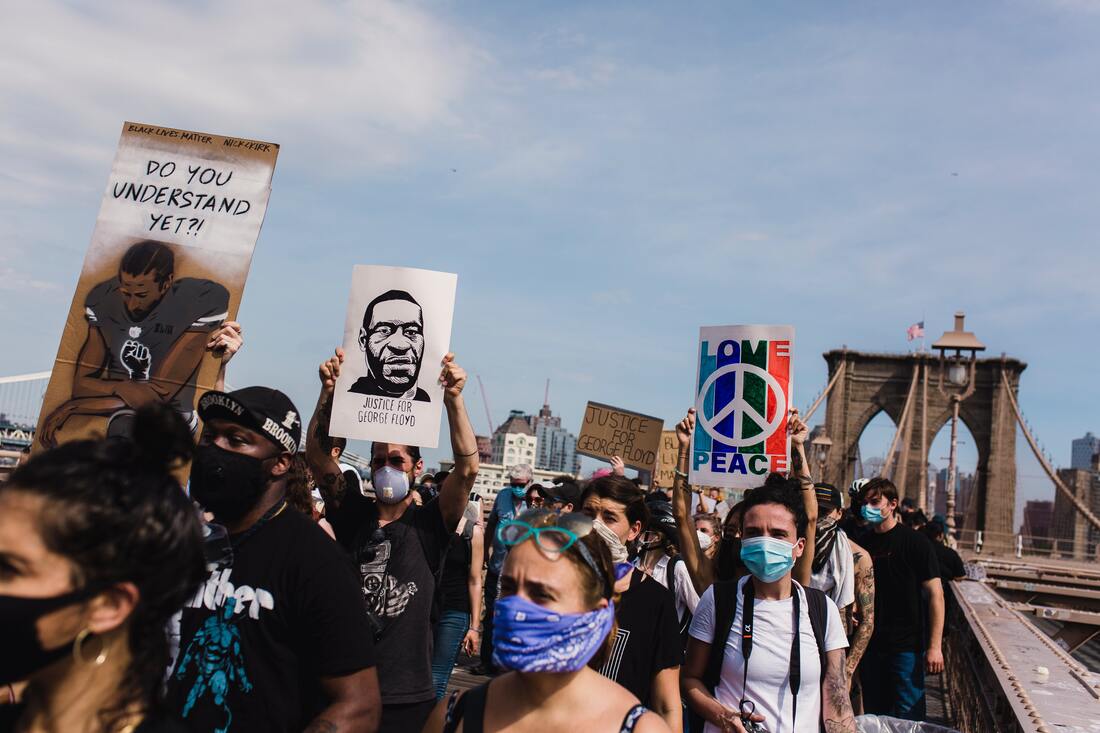|
By Anonymous | TRINICY.org It is no secret that racial tensions in the United States have increased palpably over the last few months - an increase that was catalyzed by the death of George Floyd. That’s not to say, of course, that these tensions were nonexistent before this happened. Nonetheless, this incident spurred the reemergence of the Black Lives Matter organization and nationwide protests condemning police brutality against black Americans. Within these protests, (speaking specifically about those which are being peacefully conducted), the participants often hold signs or chant in unison some of the following slogans: "Color isn’t a crime" "If we don’t get justice, shut it down" "If you’re not livid, you’re not listening" "All cops are bad" "It has been time for change" "This is what democracy looks like" Overlooking the blatant issues with some of these slogans, the message being conveyed tells a lot about what these protestors are feeling. These people are hurting. They want change. They want to put an end to racism in this country. They do not want to read any more stories about black Americans being killed unjustly at the hands of the police. Those are noble, reasonable causes. I believe that 99.999% of Americans want the same things for our country. IF WE ALL WANT CHANGE, THEN WHY CAN'T WE BRIDGE THE GAP AND AGREE? Despite this overwhelming support, deterrents still exist that prevent every American from jumping on board with the BLM organization’s views for how these changes should take place. One of these fundamental deterrents is how we as a politically, ethnically, and religiously diverse collective of American citizens view racism as a whole. With that said, I won’t pretend that I understand the way that a black American in 2020 feels when he or she sees a confederate flag, nor will I belittle him or her for the pain that he or she feels when an act of blatant racism is committed against someone of their ethnic group. However, let me be clear that I do not subscribe to the condemnation of an entire group, or our country as a whole, because of the actions of an individual. When these claims of racism are hurled at any group or nation as a whole, the cause for which the protestors march is delegitimized for many Americans. That is the point at which many protestors lose both the sympathy and attention of their fellow Americans on this issue. If we cannot agree on what racism is or who is racist, then where do we go from here? ONE WORD TO DEFINE RACISM, AND WHY IT ISN'T ACKNOWLEDGED. Consider briefly a scenario in which all citizens of this country agreed on the aforementioned points, which are summed up in this one statement: no group or nation as a whole is racist; instead, individuals within a group or nation can be racist. Surely, if everyone subscribed to that statement, then and only then can we make real change in this country towards ending racism… right? Sadly, still no. The eradication of racism in this country or the world as a whole is not achievable by human power. Racism cannot be legislated away. It cannot be forced, marched, or protested away. It cannot be removed by payment of reparations. This is outside of human control, because racism is synonymous for sin. While you will not find the word racism in the Scriptures explicitly, the Bible has a lot to say on the issue.
These points provide a brief Biblical explanation for the way Bible-believing Christians view racism. It is not an issue unique to the United States – it is a sinful condition that was spoken of throughout the Bible (for example, the Jews and Samaritans hated each other). Christians understand that sin is the inherent problem of the heart for all mankind, and racism is no exception. The removal of sin comes only by acknowledgement and repentance of said sin. Again, I ask: if we are unable to fix the problem ourselves, where do we go from here? IF FIXING RACISM IS OUTSIDE OF HUMAN ABILITY, THEN WE NEED HELP APART FROM OURSELVES. If only we had the power to fix our own sin – how much simpler this would all be. If every anti-racism law currently on the books in America had the power to eradicate racism within our borders, then we would no longer experience racism. What is one more law going to fix? There’s only one Man with the power to save us from our sin (and from each other – Acts 26:17), and He isn’t a member of the United States Congress. 1 John 1:8-10 claims that Jesus is faithful and just to forgive our sins and cleanse us if we confess those sins. The hatred and anger that lead to racism are not excluded – they are forgivable. Their removal requires that we acknowledge them in each of our lives. If we fail to acknowledge sin, then Scripture says that we are fooling ourselves. Complementary to this forgiveness of sins is that, though we are forgiven, we will still sin. The difference is that those who have been forgiven are no longer slaves to sin. Paul says in Romans 6:11-14 that we shall no longer be mastered by sin because we are covered by grace. This may seem strange to someone who has not experienced the grace of Jesus. If Salvation saves us from sin but does not remove sin from our lives, then what is the point of being a Christian? If hatred and anger still have free rein on this earth and cause havoc, pain, and destruction in spite of Jesus’s death, then why believe in a Savior who did not end all sin? UTOPIA IS COMING, BUT NOT BEFORE JESUS RETURNS. The attempts to legislate toward the end of racism, injustice, and other forms of discrimination are futile and often unsuccessful for the very reasons we have discussed. For those who make this legislation and participate in the protests, what is the ultimate goal? Utopia. These people want to create a sinless earth. However, 2 Corinthians 4:4 says that Satan is the god of this world; therefore, sin and hatred will always reign over the earth. Likewise, Philippians 3:20 tells us that this earth is not, nor was it ever meant to be our home. The earth as we know it will never be perfect. It will never be free of hatred. It will never be free of racism. Nothing apart from God Himself is perfect (Mark 10:18). But that isn’t the end of the story. There is coming a day in which God will provide for His people a sinless existence with Him in the place that He has promised to us. Isaiah 65:17-25 lays out beautifully the utopia that God has promised for us. In this passage, God says that He will create new heavens and a new earth, and that we are to rejoice and be glad forever in that. That is why Jesus came. That is why we believe in Him. That is why we hold fast to the truth of Jesus and who He is in light of a broken world. That is why we know that He is sovereign over all the sin and shame and racism on this earth. INJUSTICE WILL NOT LAST, BUT HOPE IN HIS KINGDOM WILL. Earlier, I mentioned that I personally am unable to relate to the feelings of racial injustice held by the protestors. But Scripture tells us that Jesus suffered one of the greatest injustices in the history of the world. He committed no sin. He committed no punishable offense. He did no wrong. And yet, those in power during His day allowed their hatred and jealousy to dictate their actions, leading them to murder an innocent Man. Barring the fact that Jesus was the only perfect human to ever walk the earth, the motivations in both Jesus’s death and the racially-motivated deaths we see today are the exact same. He understands your pain. While I wish that I were able to remove this pain for my fellow Americans, the fact remains that neither a law, nor a conversation, nor a protest, nor a roundtable, nor a reparation has the power to change anyone’s heart. I am glad that we have a Savior who died for the reconciliation of our hearts and not individual races. I am glad He understands our pain and that He gives us hope for the future. There is only one place where racism is eradicated: in the heart. That eradication only comes about by accepting the gift of Salvation that Jesus so freely gives through His death on the cross. That Salvation gives us hope for the utopia that is to come. Galatians 5:5 so perfectly says it: through the Spirit and by faith, we are waiting for the hope of righteousness.
1 Comment
|
Archives
May 2024
DisclaimerThe views, information, and opinions expressed in this website are solely those of the individual contributors and do not necessarily represent those of TRINICY International. Categories
All
|
Content |
Programs |
© COPYRIGHT 2018-2023
ALL RIGHTS RESERVED. |

